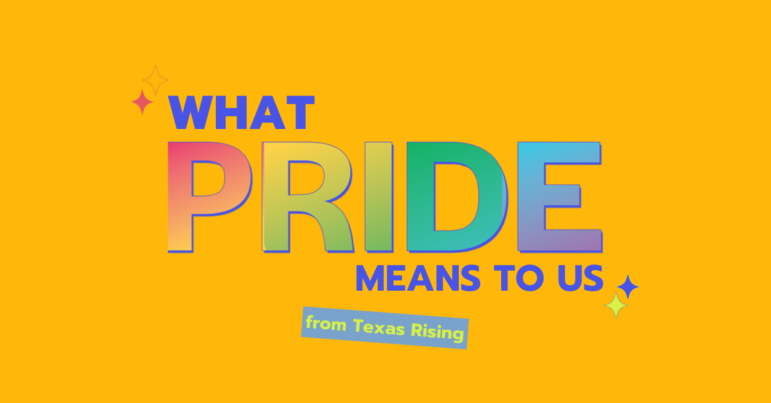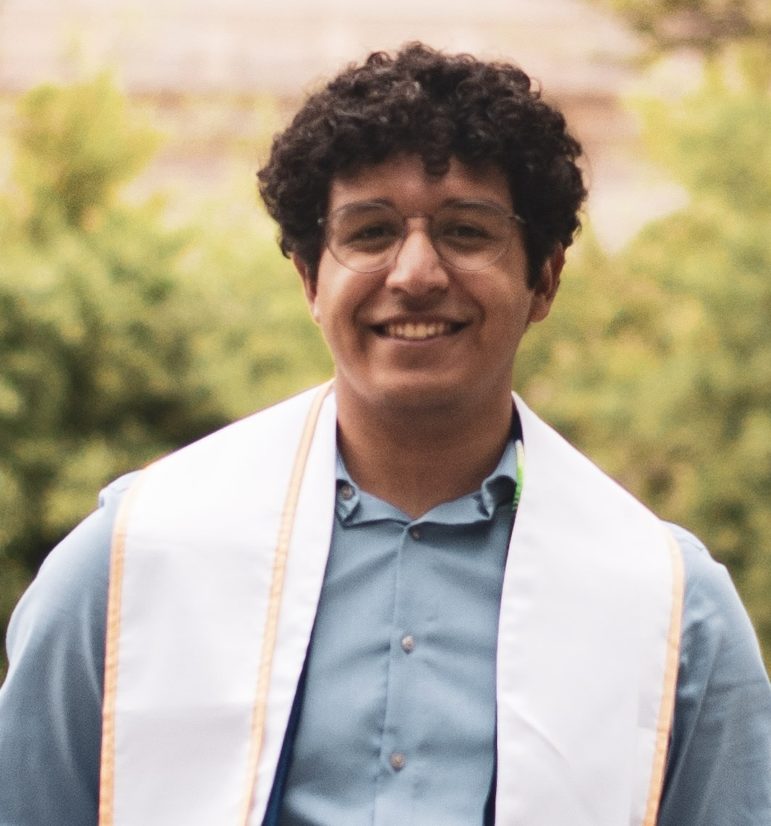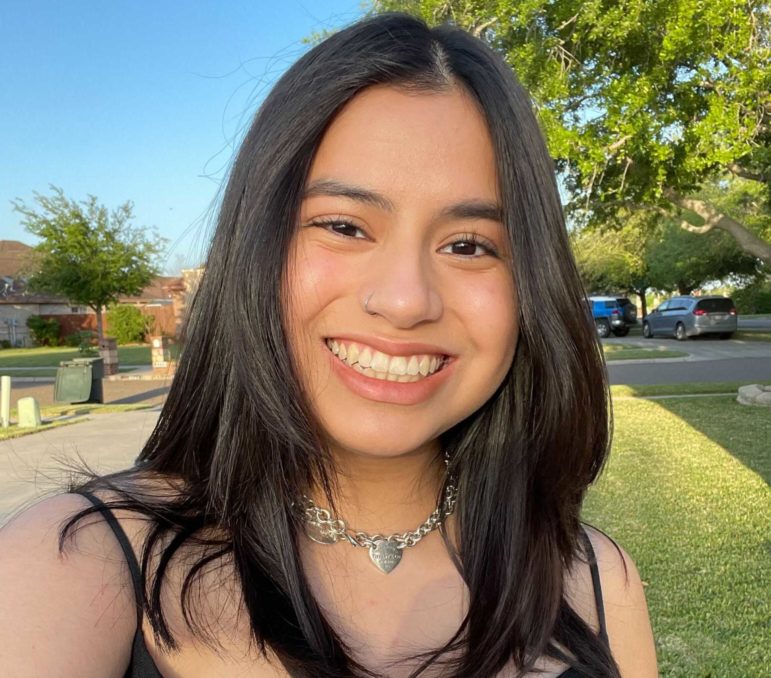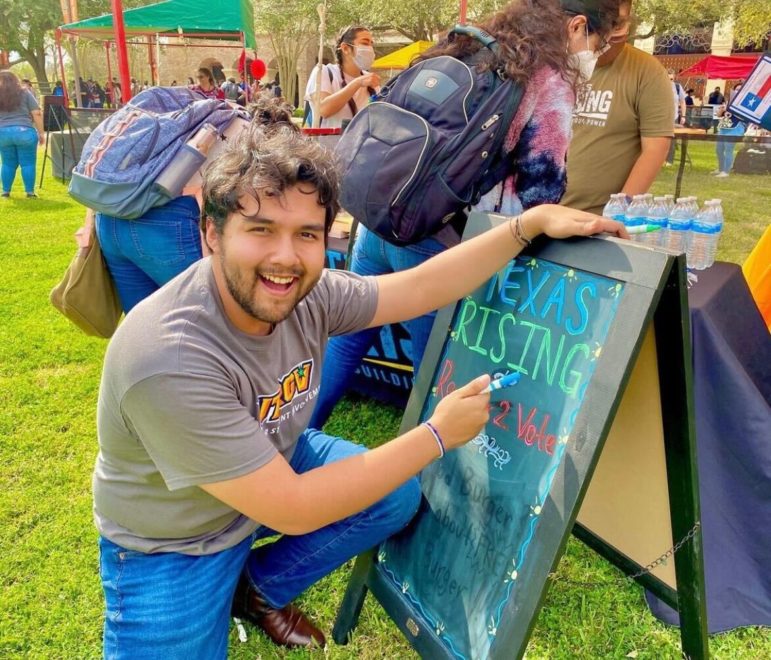It’s Pride Month, and we sat down with three Texas Rising student leaders to talk about what Pride means to them, how the work of TFN and Texas Rising fights for queer liberation, and finding community and acceptance in a state where LGBTQIA+ rights are under constant attack. Pride is still a protest–but young progressive leaders like Mireya Garcia, Ric Galvan, and José Pablo (JP) Rojas remind us that there’s so much to celebrate as well.
Meet Ric Galvan!
My name is Ric Galvan, my pronouns are he/him/his and I am the Special Projects Coordinator for Texas Rising. I was born and raised in San Antonio, Texas, and graduated from UT Austin with a bachelor’s degree in History in May 2022. I have been organizing amongst my community in San Antonio and in Austin both on my own and through Texas Rising since 2016. Most of my work has been building the political power of young people across Central Texas, particularly young Texans of color, LGBTQIA+ youth, and low-income Texans, through social and economic justice advocacy at the local and state level, as well as through local electoral campaigns.
I think my story with Texas Rising is a little unique. I’ve been with Texas Rising since I was in high school because at my school at the time, we had this class where we got to study kind of whatever we wanted from an academic angle. It was a very research-based class. It was guided, but we got to also meet with people from the community, in our local area, who do the work that we were studying. So, I had just started getting involved in politics because of the 2016 election and so, coincidentally, Rae Martinez, the Texas Rising Director, was the Regional Field Coordinator at the time. And so we connected over the summer of 2017. And that first meeting, Rae asked if I wanted to go to the Capitol with them to protest the bathroom bills, the anti-trans bills, which was a little much at the time looking back at it. But me being me, I was ready to go. And so I went for the first time, and had a good time there. And then the next year, after my senior year of high school, I joined the Texas Rising chapter at UT, kind of relaunched it with my friends, and I’ve just been here ever since.
I think first and foremost, Texas Rising, we provide a space for young people, for young queer Texans, to be themselves and to meet others who will respect them and affirm them. I think a lot about the folks in Waco at Baylor or the folks at A&M, some of the most conservative areas in the states and most conservative campuses, that they’re there proudly supporting LGBTQ people, proudly fighting for them at the state level or there in the community. They get to be some of the only safe spaces there on campus for them. I think that’s really critical. Before we even get to advocacy, making that space is really important for young queer people, young queer Texans especially, that are able to be there for as themselves and to find a space where they’ll be respected. And I think about even just having the conversations at HT [Huston-Tillotson] and St. Edwards, that are small, Christian, private universities, one being an HBCU, that they’re having those conversations that maybe they’ve never had before, and maybe they don’t know where to start on gender and sexuality. And that’s really important to begin doing the advocacy work, especially here. You know, we’ve got so much, so many bad things happening to our community across the state, that having conversations with straight people, cis people, or even people who are queer but don’t know how to fight or stand up for themselves or for other friends in the community, that starts there in these spaces that we create. And then we can go on and we can testify at the capital, we can push back against all these bad bills, and then we can elect people like Erin Zwiener in San Marcos, or Mary Gonzalez in El Paso, Jessica Gonzalez in Dallas, who will be there in the house, who will fight for us and represent us as well.
I always think about this: the people that I meet are always the most inspiring [aspect]. I do this work constantly and being in Austin, the capital, seeing all this stuff (bills) pass, and no matter how many times we went up there to fight it, it hurts. But when I was there at the capital or when I was doing phone banking, there were so many people there that I maybe never thought would be there to support our efforts to fight back against discrimination, to fight back against all these anti-trans bills, the banning of teaching certain things (books) in classrooms, particularly against sexuality which is, unfortunately, coming soon. That is such an important thing to have there, that community there, and to know that it’s growing, not just that it’s just a couple of folks. I know some of the organizers that I’ve learned from, whether it’s Rae or other people that I’ve met, Andrea from TENT, there used to not be that much energy fighting for LGBTQIA+ rights here in Texas. There were always folks there, but it wasn’t as strong. We’re at this moment where our base is building, it’s growing, it’s expanding, there are folks across the state who are saying ‘no, this is too much, this is not good, we don’t want this in our state.’ And that’s really inspiring to me, to know that it’s not just us doing it. And I know, I personally go there for myself, sure, but [also] for my friends who I really care about, who I’ve known all my life, who are trans, who are exploring themselves, or who are doing whatever it is they need to do to become their full selves. And that really matters to me, for my own self to do it, but it really shows me that, you know, this work is important, this work is meaningful, and even if we’re facing some hiccups, even though they are pretty serious hiccups, we’re on a road for progress and it’s not going to stop unless we stop.
Pride means two things to me; one, it means kind of what it says: being prideful. Knowing who you are, being comfortable with who you are, and being confident in who you are. Having that time for reflection is really important. I think having this, knowing this whole month exists, that the month of June is pride month, folks who are out or who aren’t out yet, get the time to reflect on all the stuff that they’ve been through to get to this point, all the folks they’ve met in their lives who are queer, queer-identifying, or who maybe aren’t out yet. I think it’s a big time for that: to think about what that means for yourself, your own identity, your own self-worth, your own happiness. And then, of course, there’s the other side. Pride started off as a protest and needs to continue to be one! Especially at this moment when we’re seeing so much discrimination everywhere across the country, but especially in Texas. I think [Pride Month] serves as a reminder to continue fighting for the rights that we don’t have—but to also celebrate, be proud of who we are, and how far we’ve come. Still, we have to stay in the fight and keep pushing because there’s a lot at stake.
It’s been a long journey for me. I know there are other people who have been luckier than me or who have felt more confident than I have, and there are other people who aren’t. So I think what I would say to people who are kids or anybody who’s still not out yet or [anybody] wondering if they should be or should not be, is to just love themselves, love everything about themselves. I would tell myself to love everything about me, my hair, my skin, my nose, my sexuality, all the things about me that make me me are beautiful. None of that is in any way, you know, any part of you, less deserving to be loved and respected and appreciated. Because nothing is better than being your authentic self in every space that you’re in. Yes, it’s still going to be scary. Yes, there’s going to be a time where you maybe have to hide parts of yourself that you don’t want to, but at some point, in some spaces or in most spaces, as often as you can, be your full self, don’t be afraid. And there are people who are out there who aren’t supportive of you, who may be wondering, why are you like this? Why are you thinking this way? Why do you feel this way? That’s just who you are. That’s who you are and that’s how proud you should be about yourself.
I think just making sure people know that you’re the ally in the room or that you’re the person who will make this a safe space. You never know when someone else around is fearful or needs someone to lean on. Whether that’s just talking with your family, or showing your support online. And of course, politically, stand up for us, be there for us, and stand with us when we go to the Capitol or at our city hall or we’re pushing for nondiscrimination ordinances. Be there for us as often as you can, as much as you can. I know it mattered a lot to me when my family told me that they would support me whenever, even when I wasn’t sure about myself yet. It was important for me to know, for my friends, that they’re all there with me. And lastly, I think having conversations with people who maybe aren’t fully supportive, conversations that can actually be a conversation – don’t put yourself in a place that’s not going to be good – but conversations that you can actually move people are important to have. And they’re hard. They’re not easy, and they take time, too, it’s not going to be a one-time conversation most of the time. Those are important to have because that’s how we’re going to finally make sure that queer people can be liberated all over the place.
Meet Mireya Garcia!
Mireya Garcia is a recent high school graduate and is currently a junior at the University of Texas Rio Grande Valley. She’s been active with Texas Rising since Fall 2020 and is glad to have learned so many organizing skills. In her free time, you can catch her binge-watching Glee with her dog. She loves sushi and listening to Phoebe Bridgers.
I joined Texas Rising in the fall of 2020 when I first entered UT RGV, and I was just really interested in getting more involved in my community and on campus. It was at the height of the pandemic, everything was virtual, and I did not know how to get involved. But I saw Texas rising on [a UT RGV website], and I was really drawn to the issues they organize around, and what they are passionate about. Those are also my interests and issues that I deeply cared about so I was like “I think this is a perfect match!” And ever since I’ve joined, I’ve done so much. I just really wanted to be around like-minded people who were interested in community issues. We’re able to have conversations about these things, and I love that.
I would definitely say LGBTQIA+ equality. Recently, we hosted a Trans Visibility Day Celebration, which was super awesome when we got to see the full community come together in support of the trans community here on campus. I would also say reproductive justice. That’s something I’ve worked on with Texas Rising and with another org in the past two years, which I think is super awesome and super important right now. Honestly, when I think of Texas Rising, I think of voting, because we’re always registering voters. And [another voting example], in 2021, although I was unable to participate because I was too young, some RGV members went to the state capitol to testify against some harmful bills, I believe SB 7, that would have restricted voting access.
In Texas Rising, our members and the whole team value intersectionality. I think LGBTQIA+ equality and liberation are much bigger than just queer rights— it encompasses a lot of things. So many times I see a GoFundMe for gender-affirming surgery, housing, or food. These are all vital to a queer person’s survival. Everyone’s survival impacts all of us.
For me, pride means being able to be true to yourself. It also means, for me, resilience. Because when I think of pride, I think of the LGBTQIA+ equality over hundreds of years. And it just really shows me the resilience of my community, both the queer community and my community at home.
Our Trans Day of Visibility Celebration. I think for me that was a really eye-opening experience because other RGV members and I organized this event; we reached out to community members and community orgs who offer resources for the trans community, but also for the queer community. And I just saw the full support that our community has for the trans community. It was a great event, I think we were able to have a lot of conversations about trans liberation, but it was also led by trans community members, which I think is super important. We had this really awesome guest speaker who’s kind of like a local queer historian, and they spoke about trans history within the Valley, which I think was so special because it’s not something you get to see every day, and it’s not something that’s maybe as well documented as it should be, especially in the Valley. And it was just really interesting learning about all the stories and experiences that they wrote down, they collected, for a documentary that they’re doing called Pansy Pachanga. I know a lot of RGV members also attended a local protest against Governor Abbott’s anti-trans directive to investigate the families of children receiving gender-affirming care. So again, it’s just really having these conversations about what the trans community needs, and how we can show support. And I feel it is important to celebrate trans joy and trans history.
We can always be speaking out against bills that are being passed within Texas that hurt the LGBTQIA+ community, but I think also just checking in on your queer friends, seeing how they’re doing. For me, I’ve always found Instagram kind of helpful, or social media in general. A lot of community orgs will post about what work they’re doing and what they need. So for the Valley, I would like to give a shout-out to the South Texas Equality Project. It’s a coalition of queer community members, or LGBTQ-friendly community orgs, like RGV Trans Closet, they provide free, gender-affirming care for trans members within the Valley, GENtex, again another trans community group offers trans care for the community. There are just so many things, I think it’s trying to stay in tune with your community because it’s great to support other places within Texas, but it’s always great to reach out to your community. Also, donate to GoFundMe and Mutual Aid. I think those are really important because that money will directly go to community members who need it the most.
Meet José Pablo (JP) Rojas!
“If I were speaking to a younger version of myself, I’d say: ‘If only you knew what was soon about to come for you–it would give you a little peace and hope to dream with pride about who you are and what you can be.’ I was thinking about this a couple of days ago while reflecting, about how when I was a kid, I admired people from advocacy groups and that sense of equality they were striving for. I was like, ‘Wow, I became the person that I always idolized.’ I thank orgs like Texas Rising for that because I know now that I can use my knowledge to fight for social justice, the Latinx community, and the LGBTQIA+ community. Texas Rising was such a jump start to what I can do in the future.”
The sense of community, a sense of belonging. Growing up Mexican-American, I always felt like there was this internal struggle between my heritage being from Mexico and being part of the United States. You start to question, “am I American or am I Mexican?” It gets a little more complicated when both cultures overwhelm you with the feeling that you’re not Mexican enough or not American enough. It gets even more complicated when there’s an intersectional identity. It’s a struggle being LGBTQIA+ when your culture is wrapped up in religion. Then you’re told that you can’t be religious and be LGBTQIA+–but when you look internally, you feel that you can be both. It took a very long time for me to find that sense of community that says, “it’s okay to be who you are.” That’s what inspired me to join Texas Rising, being able to see the world in color and not so black-and-white. My first interaction with Texas Rising was at a trivia night during Pride Month. I created the first Gay Straight Alliance at my school, and that opened up my viewpoint on how the world is and how the world can be.
It ensures visibility. Representation matters and by prompting a lot of us to be in spaces and filling those spaces as much as we can, it allows many of us to share our stories and share our experiences. If people can relate to us, they can know about us, and continue going along in this fight with us. Unfortunately, so many marginalized people are being politicized in this climate. We can continue fighting not just for ourselves, but for other people in the community who have experienced systemic racism and bigotry.
Pride for me means hope. It means that there’s a possibility of you being something more than what you thought you were predestined to be. Particularly growing up Latinx and LGBTQIA+, you’re subjected to this thought process that you can only be one thing. You’re told that you can only be Latinx or LGBTQIA+. Our societal constructs tell us we can only be one part of the binary. Pride is, in a way, capable of doing away with all of that. It allows us to express ourselves the way we’re meant to express ourselves and our true nature.
Whenever I’m at an event organizing or just registering people to vote, there’s this sense of unity among people who are like-minded. It’s also the ability to be open-minded. When you’re in that type of community, you see the beauty of what can be instead of what is right now. When you get out of that, you’re sucked back into reality, and you see the ugliness of the world. But when you can go back to those spaces and spread awareness, you can acknowledge someone else’s visibility. This really brings me back to the Trans Day of Visibility event we hosted at UT RGV (University of Texas Rio Grande Valley) through Texas Rising. A lot of people came and it was a very accepting space where you didn’t have to act a certain way, you could just exist there. It was a space to learn, and it allowed many people who weren’t as literate in transgender issues or hadn’t met transgender people, to respectfully ask questions. By asking questions in a respectful manner, we see that we’re all people.
If I were speaking to a younger version of myself, I’d say: “If only you knew what was soon about to come for you–it would give you a little peace and hope to dream with pride about who you are and what you can be.” I was thinking about this a couple of days ago while reflecting, on how when I was a kid, I admired people from advocacy groups and that sense of equality they were striving for. I was like, “Wow, I became the person that I always idolized.” I thank orgs like Texas Rising for that because I know now that I can use my knowledge to fight for social justice, the Latinx community, and the LGBTQIA+ community. Texas Rising was such a jump start to what I can do in the future.
By spreading awareness– reposting something on Facebook every so often during Pride, that’s fine, that’s great. Pride does have this fun section of parties and just celebrating, but also, you have to remind others why Pride exists, and what people in the LGBTQIA+ community experienced during those times when it was so stigmatized to be part of the community. In the past, it was even more extreme. People in and outside of the community sometimes forget that the people that came before us did not have it as easy as us. We have to go to Pride with a purpose and see that in the past, we couldn’t spread love like this. People should be reminded of that every single day and be sharing it with others face-to-face, by speaking with state representatives, and people outside of their social groups. We’re still so politicized as a community. The struggle hasn’t gone away, and we need to get into contact with people who have a story and share those stories, of course with permission. I think personal stories go a long way because people can relate and sympathize somehow. It just brings the good things out of humanity when we share our stories.





